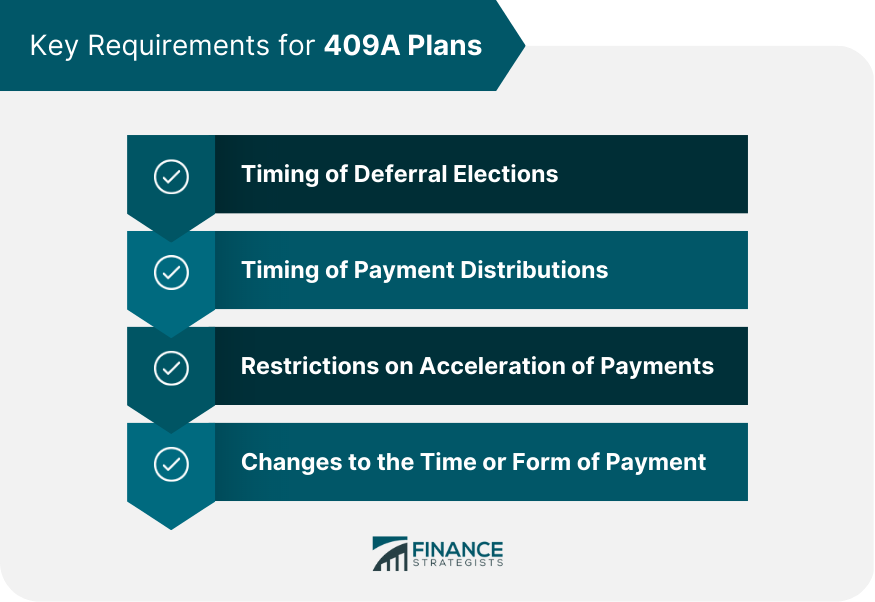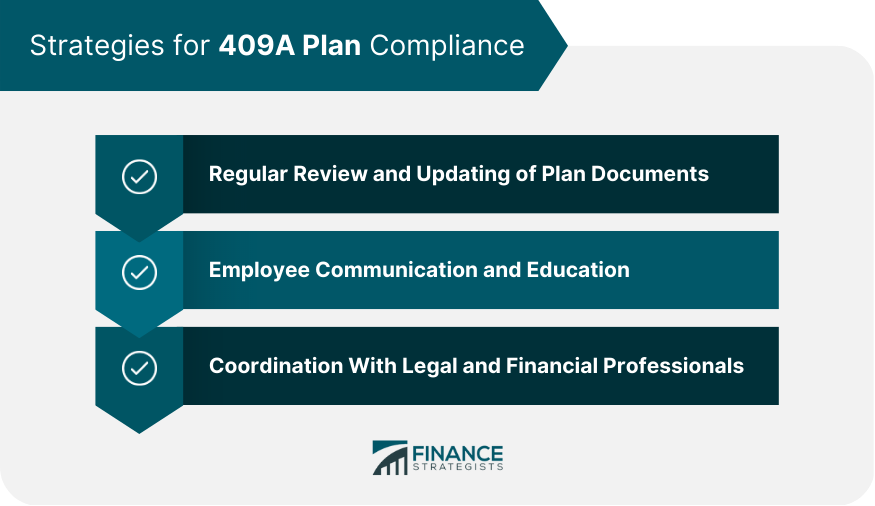A 409A plan is a nonqualified deferred compensation arrangement subject to the regulations of Internal Revenue Code (IRC) Section 409A. These plans allow employees to defer a portion of their compensation to a future date, providing tax advantages and helping employees save for retirement or other financial goals. 409A plans are designed to provide flexibility in compensation arrangements for executives and key employees while ensuring compliance with federal tax laws. Benefits of 409A plans include tax deferral, increased retirement savings, and the ability to attract and retain top talent. IRC Section 409A imposes strict regulations on nonqualified deferred compensation plans to prevent abuse of tax deferral rules. These regulations govern the timing of deferral elections, payment distributions, and other plan requirements. Deferred compensation includes any payment that an employee has a legally binding right to receive but is not paid until a later date, such as salary deferrals, bonuses, and long-term incentive plans. 409A plans can also cover stock options and SARs that are granted with an exercise price lower than the fair market value of the underlying stock on the grant date. Performance-based compensation, such as bonuses tied to specific performance metrics, can be subject to 409A regulations if the payment is not made within a specified timeframe. Severance packages may be subject to 409A regulations if they include deferred compensation or other arrangements that do not qualify for an exemption. Creating a 409A plan requires drafting plan documents that outline the terms and conditions of the arrangement, including deferral elections, payment distributions, and compliance with 409A regulations. Once the plan documents are finalized, the employer must implement the plan, enroll eligible employees, and establish procedures for deferral elections and payment distributions. Employers must ensure that their 409A plans comply with all relevant IRC Section 409A regulations to avoid penalties and adverse tax consequences for employees. Under 409A regulations, employees must make deferral elections before the beginning of the calendar year in which the compensation is earned or within a specified timeframe for performance-based compensation. 409A plans must specify the timing of payment distributions, which can be triggered by events such as separation from service, a predetermined date, change in control, disability, or death. 409A regulations generally prohibit the acceleration of payment distributions, except in limited circumstances, such as complying with a domestic relations order or paying certain employment taxes. Any changes to the time or form of payment under a 409A plan are subject to strict rules and may require a waiting period before the revised payment schedule can take effect. Payments made within a short period (typically 2.5 months) after the end of the taxable year in which the employee's right to the payment vests are exempt from 409A regulations. Certain separation pay arrangements, such as those provided under an involuntary separation or a window program, may be exempt from 409A regulations. Stock options and SARs granted with an exercise price equal to or greater than the fair market value of the underlying stock on the grant date are generally exempt from 409A regulations. Non-U.S. plans that primarily benefit nonresident aliens and meet specific requirements may be exempt from 409A regulations. Under a 409A plan, deferred compensation is generally not subject to income tax until it is paid to the employee. However, the investment earnings on the deferred amounts may be subject to taxation depending on the plan structure. Noncompliance with 409A regulations can result in significant penalties for employees, including immediate taxation of the deferred compensation, an additional 20% tax, and potential interest charges. Employers and employees must report deferred compensation under a 409A plan on their respective tax filings, such as Form W-2 for employees and Form 1099-MISC for independent contractors. Employers should regularly review and update their 409A plan documents to ensure compliance with current 409A regulations and avoid potential penalties. Providing clear communication and education about the 409A plan, including the benefits, requirements, and potential risks, is crucial to help employees make informed decisions about their deferred compensation. Working with experienced legal and financial professionals can help employers navigate the complex 409A regulations and maintain compliance with their 409A plans. Failure to comply with 409A regulations can lead to severe tax consequences for employees and potential legal disputes or regulatory scrutiny for employers. The IRS offers several correction programs to help employers address and correct certain 409A plan errors, such as the 409A Operational Compliance Program and the 409A Document Correction Program. Legal disputes and court cases involving 409A plan issues can provide guidance on interpreting 409A regulations and highlight potential pitfalls for employers and employees. 409A plans play a crucial role in managing deferred compensation arrangements for executives and key employees while ensuring compliance with federal tax laws. Employers must carefully consider the requirements and regulations governing 409A plans when establishing and maintaining their deferred compensation arrangements to avoid penalties and ensure favorable tax treatment for employees. Working with experienced legal and financial professionals is essential for navigating the complex 409A plan regulations and maintaining compliance with these critical deferred compensation arrangements.What Is a 409A Plan?
Types of Compensation Covered by 409A Plans
Deferred Compensation
Stock Options and Stock Appreciation Rights (SARs)
Performance-Based Compensation
Severance Packages
Establishing a 409A Plan
Drafting Plan Documents
Implementing the Plan
Compliance With Internal Revenue Code (IRC) Section 409A
Key Requirements for 409A Plans
Timing of Deferral Elections
Timing of Payment Distributions
Restrictions on Acceleration of Payments
Changes to the Time or Form of Payment

Exemptions From 409A Regulations
Short-Term Deferral Exception
Separation Pay Exception
Stock Option and SAR Exception
Foreign Plans Exception
Tax Implications of 409A Plans
Tax Treatment of Deferred Compensation
Penalties for Noncompliance With 409A Regulations
Reporting Requirements for Employers and Employees
Strategies for 409A Plan Compliance
Regular Review and Updating of Plan Documents
Employee Communication and Education
Coordination With Legal and Financial Professionals

Common 409A Plan Issues and Challenges
Noncompliance Consequences
Correction Programs for 409A Plan Errors
Legal Disputes and Court Cases
Conclusion
Importance of 409A Plans for Deferred Compensation Arrangements
Key Considerations for Establishing and Maintaining a 409A Plan
The Role of Legal and Financial Professionals in 409A Plan Compliance
409A Plan FAQs
A 409A plan is a type of deferred compensation plan that is subject to the rules and regulations outlined in section 409A of the Internal Revenue Code.
409A plans can be offered by private companies, but not publicly traded companies.
If a 409A plan is not structured and operated in compliance with the 409A regulations, the employee will be subject to substantial tax penalties.
A 409A plan can allow for deferral of a wide range of compensation types, including bonuses, stock options, and severance payments.
A 409A plan can be amended or terminated, but it is important to comply with the rules and regulations for doing so. For example, amendments to a 409A plan must be made in writing and may require notice to participants.
True Tamplin is a published author, public speaker, CEO of UpDigital, and founder of Finance Strategists.
True is a Certified Educator in Personal Finance (CEPF®), author of The Handy Financial Ratios Guide, a member of the Society for Advancing Business Editing and Writing, contributes to his financial education site, Finance Strategists, and has spoken to various financial communities such as the CFA Institute, as well as university students like his Alma mater, Biola University, where he received a bachelor of science in business and data analytics.
To learn more about True, visit his personal website or view his author profiles on Amazon, Nasdaq and Forbes.











